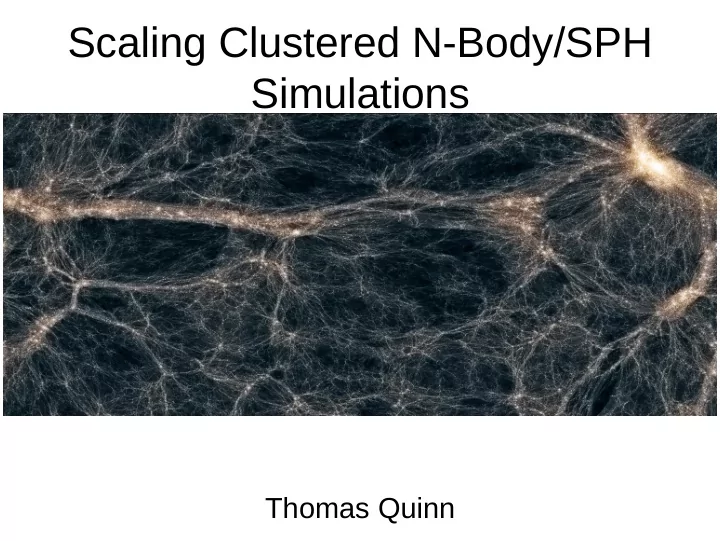

Scaling Clustered N-Body/SPH Simulations Thomas Quinn University of Washington
Laxmikant Kale Filippo Gioachin Pritish Jetley Celso Mendes Fabio Governato Lauren Anderson Amit Sharma Michael Tremmel Lukasz Wesolowski Ferah Munshi Gengbin Zheng Joachim Stadel Edgar Solomonik James Wadsley Greg Stinson Harshitha Menon
Cosmology at 380,000 years Image courtesy ESA/Planck
Cosmology at 13.6 Gigayears
... is not so simple
Computational Cosmology ● CMB has fluctuations of 1e-5 ● Galaxies are overdense by 1e7 ● It happens (mostly) through Gravitational Collapse ● Making testable predictions from a cosmological hypothesis requires – Non-linear, dynamic calculation – e.g. Computer simulation
Michael Tremmel et al, 2017
TreePiece: basic data structure ● A “vertical slice” of the tree, all the way to the root. ● Nodes are either: – Internal – External – Boundary (shared)
Overall treewalk structure 4/18/2017 Parallel Programming Laboratory @ UIUC 12
Speedups for 2 billion clustered particles
Multistep Speedup
Clustered/Multistepping Challenges ● Load/particle imbalance ● Communication imbalance ● Rapid switching between phases – Gravity, Star formation, SMBH mergers ● Fixed costs: – Domain Decomposition – Load balancing – Tree build 4/18/2017 Parallel Programming Laboratory @ UIUC 16
Zoomed Cluster simulation
Load distribution
ORB Load Balancing
LB by particle count Gravity Gas Communication SMP load sharing 29.4 seconds
LB by Compute time Star Formation 15.8 seconds
Multistepping Utilization
Small rungs: Energy Energy
Smallest step Total interval: 1 second
CPU Scaling Summary ● Load balancing the big steps is (mostly) solved ● Load balancing/optimizing the small steps is what is needed: – Small steps dominate the total time – Small steps increase throughput even when not optimal – Plenty of opportunity for improvement
GPU Implementation: Gravity Only ● Load (SMP node) local tree/particle data onto the GPU ● Load prefetched remote tree onto the GPU ● CPUs walk tree and pass interaction lists – Lists are batched to minimize number of data transfers ● “Missed” treenodes: walk is resumed when data arrives: interaction list plus new tree data sent to the GPU.
Grav/SPH scaling with GPUs
Tree walking on the GPU Jianqiau Liu, Purdue University
Paratreet: parallel framework for tree algorithms
Availability ● ChaNGa: http://github.com/N-bodyShop/changa – See the Wiki for a developer's guide – Extensible: e.g. ChaNGa-MM by Phil Chang ● Paratreet: http://github.com/paratreet – Some design discussion and sample code
Acknowledgments ● NSF ITR ● NSF Astronomy ● NSF XSEDE program for computing ● BlueWaters Petascale Computing ● NASA HST ● NASA Advanced Supercomuting
Recommend
More recommend